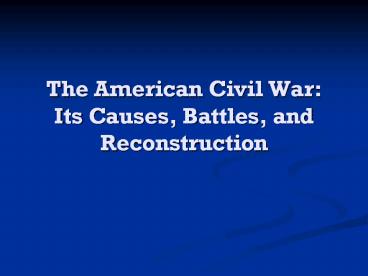The American Civil War: Its Causes, Battles, and Reconstruction - PowerPoint PPT Presentation
1 / 21
Title:
The American Civil War: Its Causes, Battles, and Reconstruction
Description:
The American Civil War: Its Causes, Battles, and Reconstruction GPS SS8H6 The student will analyze the impact of the Civil War and Reconstruction on Georgia. – PowerPoint PPT presentation
Number of Views:230
Avg rating:3.0/5.0
Title: The American Civil War: Its Causes, Battles, and Reconstruction
1
The American Civil WarIts Causes, Battles, and
Reconstruction
2
GPS SS8H6
- The student will analyze the impact of the Civil
War and Reconstruction on Georgia.
3
What do you know about the Civil War?Why was it
fought? (causes?)How did it impact our history,
and how does it still impact us today?
4
- The war was fought between the Northern and
Southern States (who succeeded from the
union).It lasted from 1861 to 1865.3 million
Americans fought in the war (21. million on Union
side and 900,000 for the Confederacy)220,000
African-American served on both sides.Over
600,000 Americans lost their lives during the
war. - The first Modern War (trench warfare, total
war, etc.)
5
Consequences of the War
- The United States has remained one nation for now
over 230 years. - The 13th Amendment in 1865 abolished slavery.
- The United States government grew in size and
became stronger over the states. - Industries of the North expanded and businessmen
became wealthier. - The West rapidly was settled and tamed.
(railroads, Indian Wars, etc.) - Southerners wanted either to create a New South
or wanted to go back to the old days. - Although slavery was abolished, blacks did not
have full freedoms (purpose of Civil Rights
Movement).
6
Part One The Causes of the War
- GPS SS8H6 We will explain the importance of key
issues that led to the Civil War including
slavery, states rights, nullification, the
Missouri Compromise, Compromise of 1850 and the
Georgia Platform, Kansas-Nebraska Act, the Dred
Scott Case. The election of 1860, the debate over
secession in Georgia, and the role of Alexander
Stephens.
7
Causes were differences over
- Slavery
- States Rights and Governments Role
- Western expansion
- Taxes and Tariffs
- Economies
- Social Order and Populations
- Agrarian vs. Urban Lifestyles
8
Cause 1Slavery in the South
- ? In 1790, only 1,000 bales of cotton produced in
Georgiabut grew to 700,000 bales of cotton in
1860. - (just under 4 million throughout the South)
- ? In 1790, there were only 30,000 slaves in
Georgia. Due to the cotton gin and demand for
more slave labor, slavery grew to 460,000 slaves
by 1860. - (4 million total in South)
- ?Before Civil War, half of Georgias wealth (400
million) was in slavery.
9
Cotton Production and Slave Population, 1790-1860
10
Slavery and King Cotton in Georgia
11
Daily Life for Slaves
- Housing (p. 228)
- Clothing (p. 228-29)
- Food (p. 229)
- Various Jobs (p. 229)
- Work demands (p. 229-30)
- Family Life (p. 230)
- Religion (p.231)
- Slave Codes (p. 233)
12
The Underground Railroad Rap
13
Underground Railroad in Georgia
14
Timeline on Abolitionists and Underground Railroad
- 1793 Cotton Gin patented by Eli Whitney
- 1831 William Lloyd Garrison begins The Liberator
- 1836 House of Reps passes gag rule
- 1837 American Anti-Slavery Society formed
- 1837 Elijah Lovejoy attacked and killed
- 1847 Frederick Douglas begins The North Star
- 1849 Harriet Tubman escaped and helps runaway
slaves
15
Timeline (cont.)
- 1850 Fugitive Slave Act (stricter laws against
runaway slaves) - 1852 Harriet Beecher Stowes Uncle Toms Cabin
- 1857 Dred Scott Decision by Supreme Court
- 1859 John Browns rebellion
- 1861 Civil War begins
- 1863 Emancipation Proclamation
- 1865 13th Amendment abolishes slavery in the
United States
16
State your opinion!!
- Imagine you are an abolitionist (antislavery
activist) before the Civil War. Write a letter
to the editor of your local newspaper or to a
friend and/or family member arguing against
slavery. (One page long) - Try incorporating these three points in your
letter. - a. Slavery is immoral and contradicts the
religious principles of our nation. - Slavery goes against the democratic ideals of
liberty and equality. - Slavery will be the cause for our nation dividing
between the North and South.
17
- "We will not resort to violence. We will not
degrade ourselves with hatred. Love will not be
returned with hate." - Dr. Martin Luther King, Jr.
18
Cause 2 States Rights and Tariffs
- Tariffs helped Northern industries, yet did
little to help the South (they preferred foreign
goods, cheaper) - 1832 South Carolina refused to follow the new
higher tariffs (Nullify) and threatened to even
succeed from Union. - President Andrew Jackson calls their bluff and
threatens to use the army. - South Carolina backed down and became resentful
19
Cause 3 Agrarian vs. Industry
- North economy based on manufacturing industry and
urbanization, while the South based on farming
and rural. - In 1850, over 600 mills in North but only 166 in
South - Only 10 of nations goods manufactured in South
20
Cause 4 Western Expansion
- South believed that more slaves in west, will
lead to more slave states more slave states,
then more Southern power in Congress maintain
power will protect slavery!! - Most Northerners wanted slavery to NOT expanded
to anymore states or territories (also concern
for Southerners thirst for more landMexico,
Cuba, etc.). Most believed that slave labor in
new territories or states will not be good for
industry. - Wanted free soil or free
labor
21
A. Missouri Compromise (1820)































